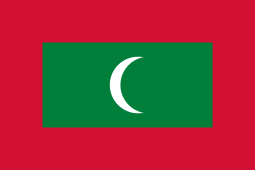Addu Atoll

Addu Atoll, previously also known as Seenu Atoll, is the southernmost atoll of the Maldives. Addu Atoll, together with Fuvahmulah, located 52.3 km north of Addu Atoll, extend the Maldives into the Southern Hemisphere. Addu Atoll is located 541 km south of Malé. Administratively, Addu Atoll is the site of Addu City, one of the two cities of Maldives. Addu City consists of the inhabited areas of Addu Atoll, namely the natural islands of Hulhudhoo, Meedhoo, Maradhoo, Feydhoo, and Hithadhoo. (The districts of Addu City are not according to the natural islands that it comprises). In addition to the areas that are included as a part of Addu City, Addu Atoll has a number of uninhabited islands, including the island of Gan, where Gan International Airport is located.
Geography and environment
Unlike other atolls of Maldives, Addu city possesses a natural anchorage within the city basin, as the atoll is land-locked with large islands surrounding the atoll. This results in a natural harbor that is very calm and safe for sea vessels at all times, and is not affected by seasonal changes. The atoll possesses four channels which lead into the lagoon. In the north are the Kuda Kandu and Maa Kandu, in the south the Gan Kandu, and the broad Villingili Kandu is to the southeast.
There are unique features in the islands of Addu Atoll. The islands are protected from the storms and high waves of the Indian Ocean by barrier reefs. Coconut palms, the national tree, are able to grow almost everywhere on the Islands. There are small lakes, wetlands, and marshy taro fields in the islands that are unique. Also, white terns known as the "dhondheeni" by Adduans gives the Atoll a uniqueness as it is found only in Addu Atoll in Maldives.
Addu Atoll also possesses particularly rich whale and dolphin fauna. A great diversity of species has been found there. Addu Atoll is the only area in the Maldives that was not affected by the 1998 global coral bleaching. The south of the Maldives was spared from the “too warm” major ocean currents (El Niño); the bright and healthy corals start at the top of giris and thilas (about 1 meter [3 ft] under the surface) and slope down with the reef to a depth of 30 meters (98 ft) or more.
Inhabited Islands of Addu Atoll
- See Addu City
- See Hulhumeedhoo (Seenu Atoll)
Uninhabited islands of Addu Atoll

- Aboohéra
- Bodu Hajara
- Boduhéragandu
- Dhigihéra
- Fahikédéhérangada
- Gan (Location of Gan International Airport)
- Gaukendi
- Geskalhuhéra
- Hankedé
- Hankedé
- Hajara
- Heré-théré (Location of Herathera Island Resort)
- Hikahera
- Kafathalhaa
- Héra
- Kandu Huraa
- Kédévaahéra
- Koahera Kuda
- Kandihéréganda
- Maahera
- Maamendhoo
- Madihéra
- Mulikédé
- Savaaheli
- Vashahéra
- Villingili (Location of Shangri-La Resort)
Linguistics
The dialect spoken is called ‘Addu bas’ and though it has similarities to the ‘Mulaku bas’ of Fuvahmulah, it is relatively different from the official form of Dhivehi language. Traditionally, ‘Addu bas’ was widely spoken amongst the educated masses of three different atolls from the south, who adopted it as their lingua franca. It has also been credited with being the most famous and widespread single dialect in the Republic of Maldives. However, when Addu declared independence and recognized themselves as the United Suvadive Republic, the Male’ language rather than ‘Addu bas’ was used in official correspondence. Nevertheless, despite the difference in dialects, the written version is common throughout the Maldives.
Culture
Long ago Addu City was ruled by families appointed by the sultans in Malé, and may have had a matrilineal system of inheritance; it is very much a man's world today. However, there was a recent period in Addu history when the status quo changed for a while, when a more matriarchal society developed and women became the breadwinners. During the Sultanate’s era, social standing in Addu depended upon one’s material.
External links
| Wikivoyage has a travel guide for Addu. |
-
 Media related to Addu Atoll at Wikimedia Commons
Media related to Addu Atoll at Wikimedia Commons
 |
Indian Ocean | Gaafu Dhaalu | Gnaviyani |  |
| Indian Ocean | |
Indian Ocean | ||
| ||||
| | ||||
| Indian Ocean | Indian Ocean |
Indian Ocean |
Coordinates: 0°39′S 73°10′E / 0.65°S 73.16°E
